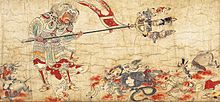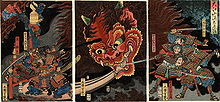悪
出典: フリー百科事典『ウィキペディア(Wikipedia)』 (2024/02/13 05:19 UTC 版)


悪は重大な不道徳を意味することもあるが[2]、一般的には、人間の状態を理解する上で何らかの根拠がないわけではなく、そこでは争いや苦しみ(cf.ヒンドゥー教)が悪の真の根源である。ある宗教的文脈では、悪は超自然的な力と表現されてきた[2]。悪の定義はさまざまであり、その動機の分析もさまざまである[3]。個人的な悪の形態と一般的に関連する要素には、怒り、復讐、恐怖、憎悪、心理的トラウマ、便宜主義、利己主義、無知、破壊または無視を含む不均衡な行動が含まれる[4]。
悪は、善とは反対の二元的な敵対的二元論として認識されることがある[5]。その場合、善が勝ち、悪は打ち負かされるべきとされる[6]。仏教の精神的影響力を持つ文化では、善と悪の両方が対立的な二面性の一部として認識されており、それ自体は成仏によって克服されなければならないものとされる[6]。善と悪に関する哲学的な問題は、善と悪の性質に関するメタ倫理学、どのように行動すべきかに関する規範倫理学、特定の道徳的問題に関する応用倫理学という3つの主要な研究領域に包含されている[7]。この用語は、行為主体を伴わない事象や状況に適用されるが、この記事で扱う悪の形態は、悪人またはその実行者を想定している。
宗教や哲学の中には、人間を記述する際に悪の存在や有用性を否定するものもある。
日本語における「悪」
日本語における「悪」という言葉は、もともと剽悍さや力強さを表す言葉としても使われ、否定的な意味しかないわけではない。例えば、源義朝の長男・義平はその勇猛さから「悪源太」と、左大臣藤原頼長はその妥協を知らない性格から「悪左府」、江戸時代初期に権勢を振るった以心崇伝はその強引な政治手法により「大欲山気根院僭上寺悪国師」と評された。鎌倉時代末期における悪党もその典型例であり、力の強い勢力という意味である。[独自研究?]
本来「悪」は「突出した」という意味合をもつ。突出して平均から外れた人間は、広範囲かつ支配的な統治、あるいは徴兵した軍隊における連携的な行動の妨げになり、これゆえ古代中国における「悪」概念は、「命令・規則に従わないもの」に対する価値評価となった。一方「善」概念は、「皇帝の命令・政治的規則に従うもの」に対する価値評価である。
『古事記』において、「悪事」は「マカゴト」と読ませる(古代の解釈では、悪の訓読みは「マカ・マガ」となる)。対して、「善事」は「ヨゴト」と読む。現代では、マガゴトの漢字は「禍事」を当て、ヨゴトは「吉事」の字を当てていることからも、古代の感性では、禍(か)=災い=悪という図式ということになる。
なお現在の日本での悪概念は、西欧の価値観に近いものとはなっているが、依然として相違を含んでいる。
善と悪
悪は善と対比される。
人間が善悪を意識、判断する場面は様々だが、家庭での躾から、教育、スポーツ、法律など、秩序を必要とするあらゆる場面で見出せる。生活に即したものとして宗教で、娯楽や伝承として物語の上で取り上げられることも多い。その際は、善をすすめ悪を除外すること(勧善懲悪)、善と悪との対決などがしばしば注目される。
善と悪は解釈や判断によって入れ替わる場合もあるため、規範という形で存在するものは、このような混乱を避けるためによく用いられる手段なのだ。
- ^ Griffin, David Ray (2004) [1976]. God, Power, and Evil: a Process Theodicy. Westminster. p. 31. ISBN 978-0-664-22906-1
- ^ a b “Evil”. Oxford University Press (2012年). 2019年12月8日閲覧。
- ^ Ervin Staub. Overcoming evil: genocide, violent conflict, and terrorism. New York: Oxford University Press, p. 32.
- ^ Matthews, Caitlin; Matthews, John (2004). Walkers Between the Worlds: The Western Mysteries from Shaman to Magus. New York City: Simon & Schuster. p. 173. ASIN B00770DJ3G
- ^ de Hulster, Izaak J. (2009). Iconographic Exegesis and Third Isaiah. Heidelberg, Germany: Mohr Siebeck Verlag. pp. 136-37. ISBN 978-3-16-150029-9
- ^ a b Ingram, Paul O.; Streng, Frederick John (1986). Buddhist-Christian Dialogue: Mutual Renewal and Transformation. Honolulu: University of Hawaii Press. pp. 148-49. ISBN 978-1-55635-381-9
- ^ Internet Encyclopedia of Philosophy "Ethics"
- ^ a b c Roy F. Baumeister "Human Evil: The Mythical and the True Causes of Violence" Florida State University. archive
- ^ Stern, Fritz; Lifton, Robert Jay (1986). “The Nazi Doctors: Medical Killing and the Psychology of Genocide”. Foreign Affairs 65 (2): 404. doi:10.2307/20043033. ISSN 0015-7120.
- ^ Dower, John W. (2017), War without mercy : race and power in the pacific war, Tantor Media, ISBN 978-1-5414-2124-0, OCLC 982707419 2019年12月8日閲覧。
- ^ Hesse, Petra; Mack, John E. (1991). Rieber, Robert W.. ed (英語). The Psychology of War and Peace: The Image of the Enemy. Boston, MA: Springer US. pp. 131-153. doi:10.1007/978-1-4899-0747-9_6. ISBN 978-1-4899-0747-9
- ^ Baumeister, Roy F. (2005). The cultural animal : human nature, meaning, and social life. Oxford University Press. ISBN 0-19-516703-1. OCLC 770765517
- ^ Baumeister, Roy F.; Smart, Laura; Boden, Joseph M. (1996). “Relation of threatened egotism to violence and aggression: The dark side of high self-esteem.”. Psychological Review 103 (1): 5-33. doi:10.1037//0033-295x.103.1.5. ISSN 0033-295X.
- ^ Bushman, Brad (1998年). “Threatened egotism, narcissism, self-esteem, and directed and displaced aggression: Does self-love or self-hate lead to violence?”. PsycEXTRA Dataset. 2019年12月8日閲覧。
- ^ Solomon, Richard L.; Corbit, John D. (1974). “An opponent-process theory of motivation: I. Temporal dynamics of affect.”. Psychological Review 81 (2): 119-145. doi:10.1037/h0036128. ISSN 1939-1471.
- ^ O'Neal, Edgar C. (1994). “Human aggression, second edition, edited by Robert A. Baron and Deborah R. Richardson. New York, Plenum, 1994, xx + 419 pp” (英語). Aggressive Behavior 20 (6): 461-463. doi:10.1002/1098-2337(1994)20:63.0.CO;2-O. ISSN 1098-2337.
- ^ Bushman, Brad J.; Geen, Russell G. (1990). “Role of cognitive-emotional mediators and individual differences in the effects of media violence on aggression.”. Journal of Personality and Social Psychology 58 (1): 156-163. doi:10.1037/0022-3514.58.1.156. ISSN 1939-1315.
- ^ Baumeister, Roy F. (2006). Losing control : how and why people fail at self-regulation. Academic Press. ISBN 0-12-083140-6. OCLC 553911110
- ^ Bushman, B. J.; Cooper, H. M. (1990-05). “Effects of alcohol on human aggression: an integrative research review”. Psychological Bulletin 107 (3): 341-354. doi:10.1037/0033-2909.107.3.341. ISSN 0033-2909. PMID 2140902.
- ^ Good and Evil in Chinese Philosophy Archived 2006年5月29日, at the Wayback Machine. C.W. Chan
- ^ History of Chinese Philosophy Feng Youlan, Volume II The Period of Classical Learning (from the Second Century B.C. to the Twentieth Century A.D). Trans. Derk Bodde. Ch. XIV Liu Chiu-Yuan, Wang Shou-jen, and Ming Idealism. part 6 § 6 Origin of Evil. Uses strikingly similar language to that in the etymology section of this article, in the context of Chinese Idealism.
- ^ a b Benedict de Spinoza, Ethics, Part IV Of Human Bondage or of the Strength of the Affects Definitions translated by W. H. White, Revised by A. H. Stirling, Great Books vol 31, Encyclopædia Britannica 1952 p. 424
- ^ Stephen Palmquist, Dreams of Wholeness: A course of introductory lectures on religion, psychology and personal growth (Hong Kong: Philopsychy Press, 1997/2008), see especially Chapter XI.
- ^ Book website
- ^ Philosophy of Religion Charles Taliaferro, Paul J. Griffiths, eds. Ch. 35, Buddhism and Evil Martin Southwold p 424
- ^ Lay Outreach and the Meaning of “Evil Person Taitetsu Unno Archived 2012年10月18日, at the Wayback Machine.
- ^ The Jewel Ornament of Liberation. Gampopa. ISBN 978-1559390927[要ページ番号]
- ^ Hans Schwarz, Evil: A Historical and Theological Perspective (Lima, Ohio: Academic Renewal Press, 2001): 42-43.
- ^ Schwarz, Evil, 75.
- ^ Thomas Aquinas, SUMMA THEOLOGICA, translated by the Fathers of the English Dominician Province (New York: Benziger Brothers, 1947) Volume 3, q. 72, a. 1, p. 902.
- ^ Henri Blocher, Evil and the Cross (Downers Grove: InterVarsity Press, 1994): 10.
- ^ Gaymon Bennett, Ted Peters, Martinez J. Hewlett, Robert John Russell (2008). "The evolution of evil". Vandenhoeck & Ruprecht. p.318. ISBN 3525569793
- ^ Gourevitch, Phillip (1999). We Wish to Inform You That Tomorrow We Will be Killed With our Families. Picador. ISBN 0-31224-335-9
- ^ “Frontline: the triumph of evil.”. 2007年4月9日閲覧。
- ^ url=http://www.vatican.va/archive/catechism/p3s1c1a6.htm
- ^ Harris, Sam (2004). The End of Faith: Religion, Terror and the Future of Reason. W. W. Norton & Company. ISBN 0-393-03515-8
- ^ a b Peck, M. Scott. (1983;1988). People of the Lie: The hope for healing human evil. Century Hutchinson.
- ^ Peck, M. Scott. (1978;1992), The Road Less Travelled. Arrow.
- ^ Peck, 1983/1988,p105
- ^ Peck,1978/1992,p298
- ^ Martin Luther, Werke, XX, p58
- ^ a b Niccolo Machiavelli, The Prince, Dante University of America Press, 2003, ISBN 0-937832-38-3 ISBN 978-0-937832-38-7
- >> 「悪」を含む用語の索引
- 悪のページへのリンク

